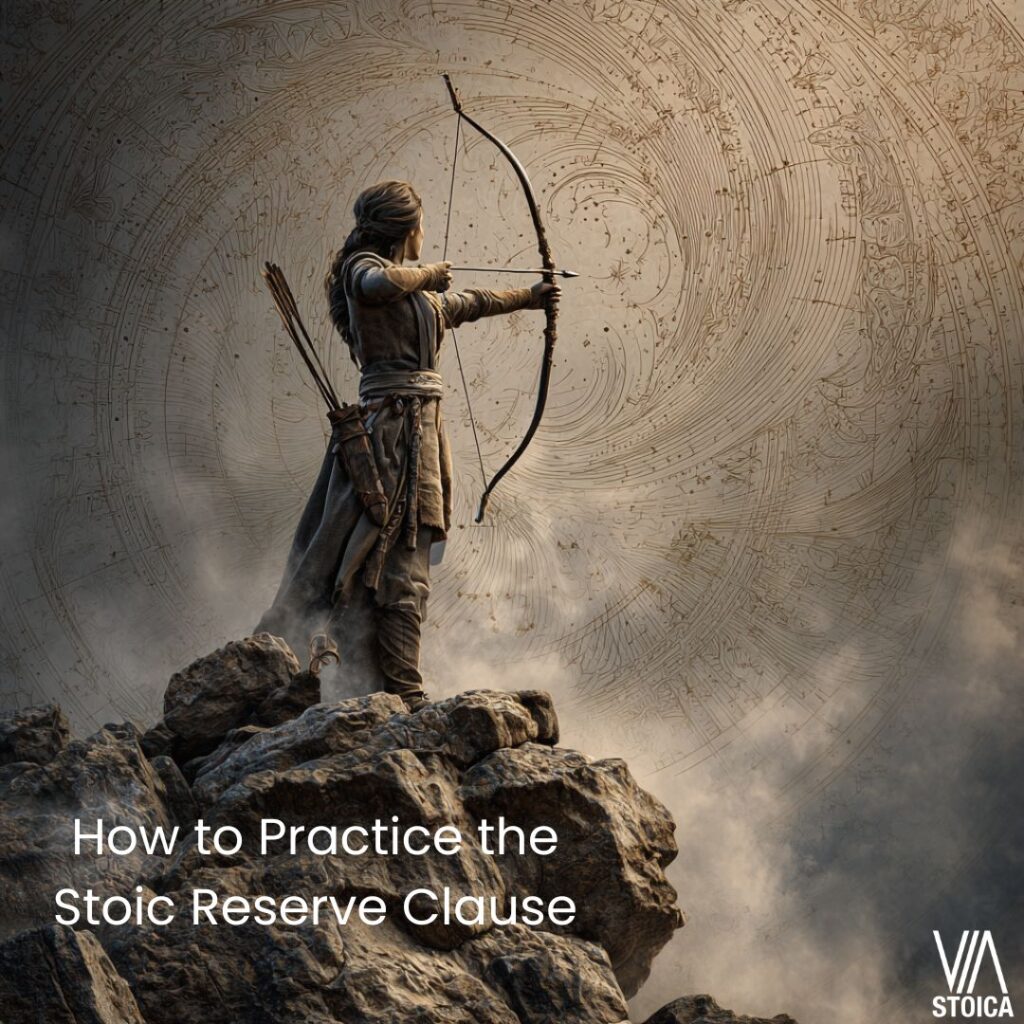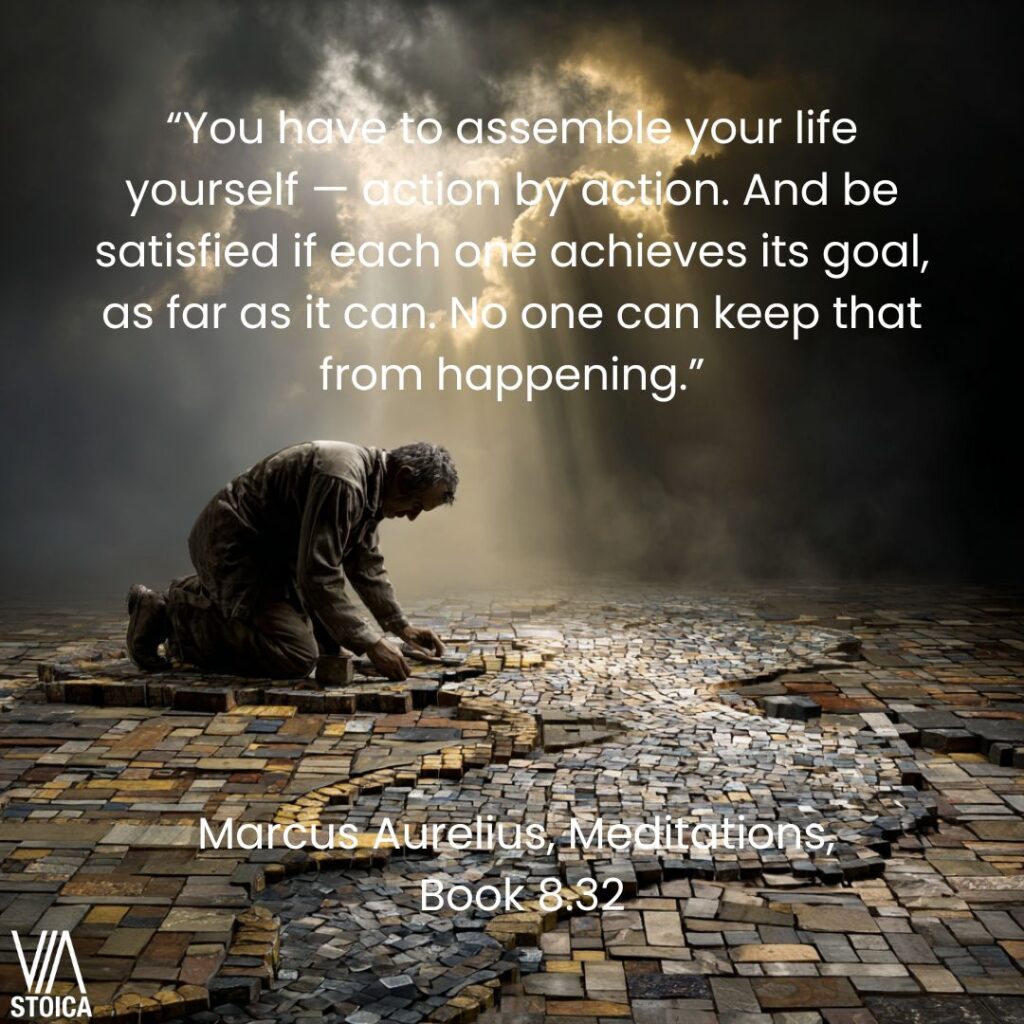Introduction and Clear Definition

In the writings of Marcus Aurelius, Epictetus, and Seneca, we encounter a deceptively simple yet profound practice: the Stoic reserve clause. Known in Greek as hupexhairesis and in Latin as exceptio, the reserve clause is the habit of acting while mentally adding a condition; “if nothing prevents it,” “fate permitting,” or “God willing.”
This practice embodies the Stoic conviction that while our intentions are within our power, the outcomes depend on external factors and on fate. By adopting the reserve clause, the Stoic both commits wholeheartedly to action and remains free from disappointment if events turn out otherwise. As Pierre Hadot explains:
“In Marcus Aurelius, but also in Epictetus and in Seneca, the vocabulary of the discipline of action includes a technical term meaning ‘to act with a reserve clause’ (Greek hupexhairesis; Latin exceptio), which implies the transcendence of intention with regard to its objects.”
Pierre Hadot, The Inner Citadel, Chapter 8, p. 283
Far from being an excuse for passivity, the reserve clause is a practice of aligning our lives with nature, combining effort with acceptance.
Philosophical Grounding
The philosophical foundation of the reserve clause can be traced to early Stoic distinctions between skopos (goal) and telos (end). The Stoic archer analogy illustrates this beautifully: the archer aims with all his skill at the target (skopos), but whether the arrow hits depends on factors beyond his control. The true good (telos) lies not in the hit but in the quality of the aim.
Hadot summarizes this distinction in his study of Marcus Aurelius:
“Whoever has the firm, fixed moral intention to carry out a given action is like an archer aiming at a target (skopos). It does not depend entirely on him whether he hits the target or not; likewise, he can only wish for the goal with a reserve clause: namely, on the condition that Destiny also wills it.”
Pierre Hadot, The Inner Citadel, Chapter 8, p. 284
Epictetus describes this attitude in the Discourses:
“I have submitted my impulses to god. Is it his will that I should have a fever? It is my will too. Is it his will that I should set out to get something? It is my will too. Is it his will that I should desire something? It is my will too. Is it his will that I should get something? It is mine too. That is not his will. It is not mine.”
Epictetus, Discourses, Book 4, Chapter 1.90
Here Epictetus makes the essence of the reserve clause explicit: our intentions remain firm, but they are always “reserved” to accord with fate or the will of God.

Seneca gives the same lesson in practical Roman terms, in On the Tranquility of the Mind:
“The safest course is to tempt Fortune only rarely but always to keep her in one’s thoughts, never placing any trust in her promises but saying instead: ‘I will make the voyage unless something happens,’ ‘I will become praetor unless something stands in my way,’ and ‘My business venture will succeed unless something interferes.’”
Seneca, On the Tranquility of the Mind, 13
Here we see the reserve clause as a daily habit: anticipate Fortune’s interference and you will never be surprised.
Marcus Aurelius, finally, shows us how the practice becomes an existential posture:
“You have to assemble your life yourself — action by action. And be satisfied if each one achieves its goal, as far as it can. No one can keep that from happening.”
Marcus Aurelius, Meditations, Book 8.32
The emperor’s words echo the principle: what matters is the integrity of each action, not the fate of the larger plan.
Related Practices: Amor Fati and Negative Visualization
The reserve clause aligns closely with other core Stoic exercises:
- Amor Fati (Love of Fate): Rather than merely accepting outcomes, the Stoic seeks to love whatever happens, understanding it as part of a larger rational order. The reserve clause is the “mental reservation,” but amor fati is the emotional embrace.
- Premeditatio Malorum (Negative Visualization): By deliberately imagining obstacles, loss, or failure before they occur, we soften their impact and prepare ourselves. This practice dovetails with Seneca’s advice: expect Fortune to intervene. If you already foresaw it, the disruption cannot wound you.
Together, these practices reinforce the same truth: externals are not ours to control, and peace comes from aligning will with necessity.
Concerns and Debates
Ancient Stoics and modern scholars alike have raised questions about the reserve clause:
- Is it fatalistic? Critics worried that if everything depends on fate, why act at all? Epictetus answers that our prohairesis (moral will) is free; we must act with virtue even if the results are uncertain.
- Does it breed passivity? Some Romans feared that acting with constant reservations would weaken resolve. Seneca, however, stresses that it sharpens foresight and strengthens courage: you plan with Fortune’s interference in mind, so you are never surprised.
- Is it too pious? Some translations render the clause as “If God wills it,” which sounds religious. For Stoics, “God” meant the rational Logos of the cosmos. Whether framed as “God willing” or “if circumstances allow,” the meaning is the same: submit intention to necessity.
- Modern perspectives: Pierre Hadot emphasizes the reserve clause as an inner discourse, a way of transcending attachment to outcomes. Donald Robertson frames it as a psychological strategy for resilience, while Massimo Pigliucci highlights its ethical weight: it ensures that what matters most is integrity of action, not external success.

Application and Relevance Today
Why does the reserve clause matter in modern life? Because our world is defined by uncertainty. We plan careers, relationships, projects, and then market crashes, illnesses, or unexpected disruptions intervene. Without the reserve clause, these events can feel like failures, crushing our sense of purpose.
Practicing the reserve clause transforms this. It reminds us that:
- Our freedom lies in intention, not outcome.
- Disappointment can be avoided by preparing for obstacles.
- We can act with commitment, but without clinging.
In practical terms, this practice helps us:
- Handle setbacks without bitterness.
- Pursue ambition without slavery to success.
- Navigate uncertainty without paralysis.
Practical Exercises
1. Add the Clause to Your Intentions
Before starting your day, write down your plans with the clause attached:
- “I will finish this report, if nothing prevents it.”
- “I will meet my friend for dinner, if fate allows.”
Stoic Reference: Epictetus, Discourses 4.1.90.
2. Practice the Archer’s Aim
Visualize yourself as an archer. Choose a daily goal (skopos). Aim carefully: do everything within your power. Then release attachment to whether you hit the target. In journaling, ask: “Did I aim well? Did I act with integrity?”
Stoic Reference: Hadot, The Inner Citadel, p. 284.
3. Anticipate Obstacles Like Seneca
At the start of each week, list your key plans. For each, add what might block it:
- “Trip to the city — unless illness intervenes.”
- “Work promotion — unless organizational changes occur.”
By rehearsing obstacles (premeditatio malorum), you disarm Fortune’s surprises.
Stoic Reference: Seneca, On the Tranquility of the Mind, 13.
Final Reflection
The Stoic reserve clause teaches us that freedom lies in the quality of our intentions, not in the results. By adding the simple phrase “if nothing prevents it,” or “if God wills it,” we align ourselves with fate without surrendering our agency.
We become like archers: aiming well, but unconcerned with whether the arrow hits. Our flourishing depends not on externals but on our ability to act with integrity in each moment. In this sense, the reserve clause is the practical expression of amor fati, not just acceptance, but love of whatever unfolds.
Want to explore more Stoic practices?
Book a free consultation with one of our Stoic Coaches to get support. Or read more about How to Practice Stoicism. Listen to the Via Stoica Podcast on Spotify, Apple Podcasts, or YouTube.
Author Bio
Benny Voncken is the co-founder of Via Stoica, where he helps people apply Stoic philosophy to modern life. He is a Stoic coach, writer, and podcast host of The Via Stoica Podcast. With almost a decade of teaching experience and daily Stoic practice, Benny creates resources, workshops, and reflections that make ancient wisdom practical today.
FAQ
Q: Is the reserve clause just fatalism?
No. Fatalism would say “Why act at all?” The reserve clause insists you must act, but with the awareness that results are not fully yours.
Q: Did all Stoics use the clause the same way?
Epictetus used it technically, Seneca practically, and Marcus Aurelius existentially. The principle is shared, but their styles differ.
Q: How is this different from resignation?
Resignation abandons effort. The reserve clause doubles effort in intention, while loosening attachment to outcomes.
Q: How does this relate to other Stoic practices?
It works together with premeditatio malorum (anticipating obstacles) and amor fati (loving fate). All three protect freedom by keeping our will aligned with what is possible.Q: Can this help with anxiety?
Yes. By framing plans with “if nothing prevents it,” you reduce the shock of disruption and protect peace of mind.



0 Comments